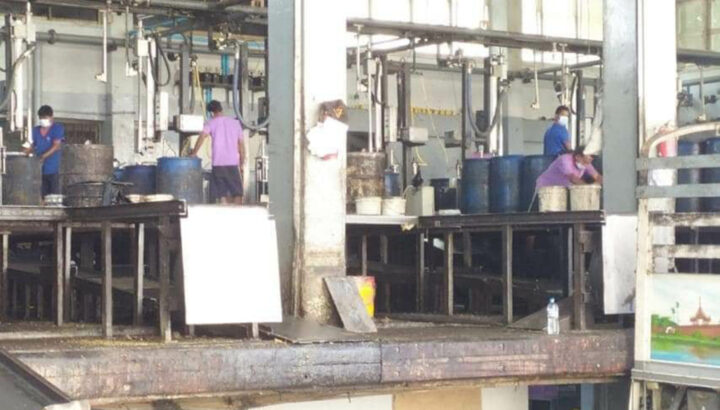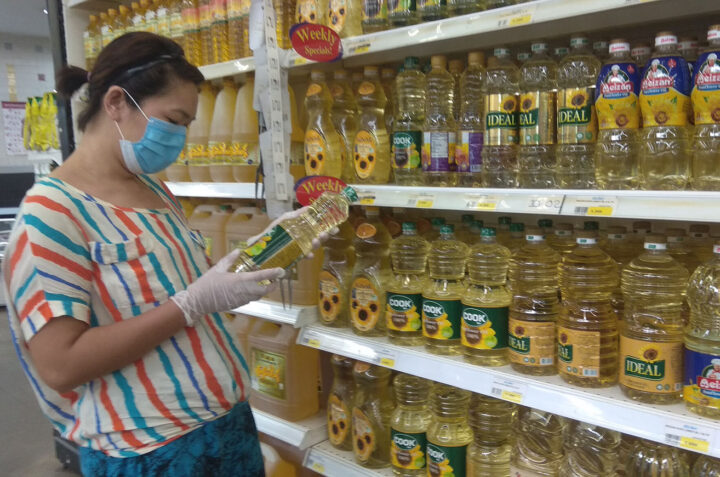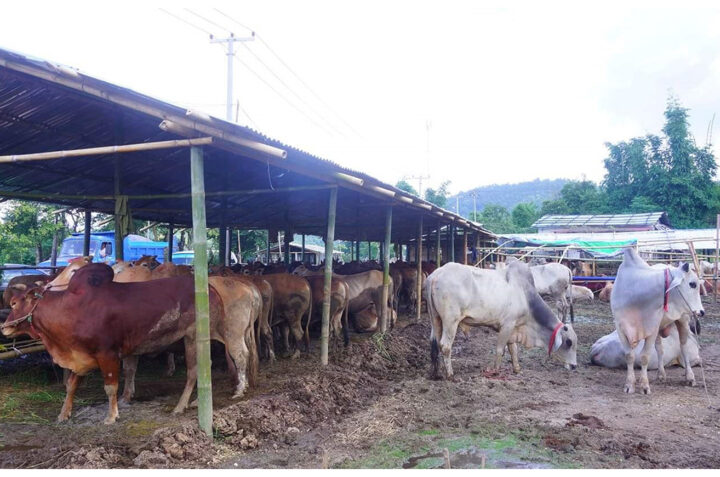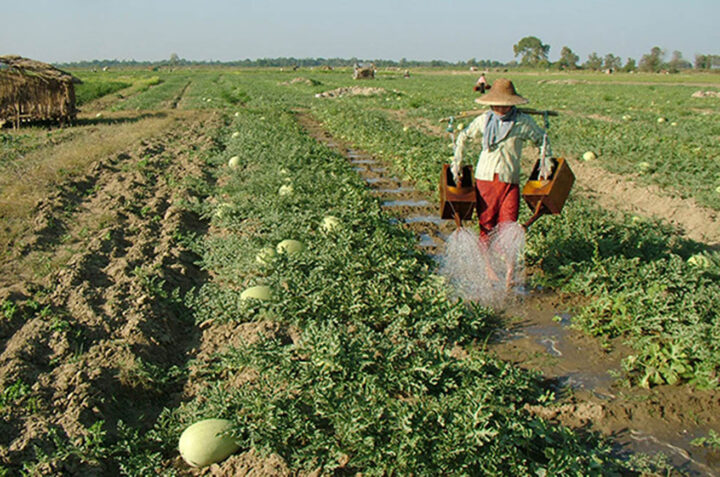![]() — Home — Business News
— Home — Business News
Weekly Business News from Myanmar
-

Myanmar Edible Oil Dealers’ Association (MEODA) urged distributors to sell palm oil at reasonable price during pandemic period
The palm oil distributors need to sell the palm oil at a reasonable price to prevent the shortage of domestic palm oil as imported palm oil prices are high during the pandemic period, said the Myanmar Edible Oil Dealers’ Association (MEODA) in its statement on 7 January, “Currently, the domestic palm oil price is rising as imported oil prices are on the rise,” said MEODA Chair U San Lin. “These days, the price of imported oil is on the rise. As you know, the domestic edible oil price is directly linked to the international price. That is the reason why our domestic palm oil price is hiking in this pandemic period,” he explained. Myanmar annually imports 700,000 tonnes of palm oil from Malaysia and Indonesia to meet the domestic demand, he added. The association is coordinating with the relevant government departments to distribute the healthy palm oil at a reasonable price and meet the domestic market’s self-sufficiency in COVID-19 period. According to the Malaysian Palm Oil Board (MPOB) official data, about 2 million metric tons of palm oil were stockpiled in 2019, and about 1.2 million metric tons also accumulated in January 2021. -

Yangon Stock Exchange (YSX) stock trading divided in 2020 due to the COVID – 19 resurgence in Myanmar
According to the annual report released by the exchange, a total of K12.6 billion worth of 1.87 million shares by six listed companies were traded on the Yangon Stock Exchange (YSX) in 2020, a significant drop compared to 2019. Over 2.4 million shares from five listed companies, valued K13.39 billion, were traded on the exchange in 2019. Both continuous trading and block trading on YSX fell in 2020 despite Ever Flow River Group Public Co’s (EFR) debut, on the exchange on 28 May 2020. Amid the COVID-19 crisis, Myanmar’s securities market has been able to continue operating without stopping trading. At present, shares of six listed companies — First Myanmar Investment (FMI), Myanmar Thilawa SEZ Holdings (MTSH), Myanmar Citizens Bank (MCB), First Private Bank (FPB), TMH Telecom Public Co. Ltd (TMH) and the EFR are being traded on the exchange. In 2020, the value of stocks traded on the exchange peaked at K1.48 billion in February. In contrast, trading on the exchange registered an all-time low of K552.9 million in November due to the COVID-19 resurgence in Myanmar. -

The price of domestic palm oil is on the rise due to the global production is declining
According to the Myanmar Edible Oil Dealers Association, the domestic palm oil is on the rise as it tracks the imported oil price. “The domestic edible oil price is related to the international price. It has risen because of the rise in the global market,” Chair U San Lin of the association. Myanmar yearly imports 700,000 tonnes of palm oil from Malaysia and Indonesia to meet local demand. Those countries faced unpredictable weather condition, and the production declined. Consequently, the edible oil price has risen. “The reasons for rising edible oil price is production slump caused by erratic weather conditions, such as flood and La Niña, coupled with the COVID-19 impacts,” he continued. Additionally, the temporary storage of palm oil in those countries and tax hike caused other price rise reasons, the association stated. -

Local firm, Nara Green Tea will export its first hibiscus tea to the United State (US) starting from this month
Nara Green Tea will export hibiscus tea also called roselle herbal tea made from roselle bud to the United State. “We will export roselle herbal tea at a price of $2 per box to the dealer in the States. Roselle herbal tea from Myanmar is not like those from other countries. It is not very sour but tasty to drink. When giving the samples to foreign friends, they love it,” Ko Kyaw Thiha, Managing Director of Nara Green Tea, said. The company will export its very first batch of roselle herbal tea to the retail shops in the US this month. -

The agricultural exports reached a high of USD $ 936 million as of 18 December 2021 amid COVID – 19 impacts
The agricultural exports have touched a high of US$936.074 million as of 18 December 2020 in the current financial year since 1 October 2020 despite a drastic drop in overall export values amid the COVID-19 impacts. The figures reflect a significant rise of $156.3 million this FY. The agro exports soared from $779.69 million in the corresponding period of the 2019-2020FY, according to the trade figures released by the Ministry of Commerce. Myanmar’s agricultural exports rose regardless of the impact of the coronavirus on foreign demand. In the exports sector, the agriculture industry performed the best, accounting for 22 per cent of overall exports. The agricultural industry’s chief export items are rice and broken rice, pulses and beans, and maize. Fruits and vegetables, sesame, dried tea leaves, sugar, and other agro products are also shipped to other countries. Myanmar agro products are primarily exported to China, Singapore, Malaysia, the Philippines, Bangladesh, India, Indonesia, and Sri Lanka. Sometimes, the export market remains uncertain due to unsteady global demand. -

The cattle exporters expected to get positive negotiation outcomes on legitimate export to China at the end of January 2021
China and Myanmar will negotiate on legitimate export of cattle in January-end, prompting the exporters to keep waiting for positive outcomes to send about 15,000 heads of cattle stranded in Muse to China, according to the Mandalay Region Cattle Exporters Association. “The cattle are still stranded in Muse. We are anticipating G-to-G pact for legal export. For now, the exporters are still struggling,” Chair U Soe Naing of the exporters association affirmed. “Last early December, about 70 companies of cattle stranded in Muse arranged to bring the cattle back to their home owing to the burden of labour wages and high feedstuff cost. The association stopped them to wait for another month,” he continued. About 15,000 heads of cattle, owned by 150 companies, are stranded in Muse border as China stopped purchasing cattle. The labour wages and feedstuff cost burden them. It costs K400,000-600,000 to take care of 100 heads of cattle every day. China permits live cattle import only after ensuring the cattle is free from 20 diseases, including Foot and Mouth Disease, along with vaccination certificates, health certificates, and farming registration certificates. Therefore, the officials concerned from the two countries are negotiating this. -

Myanma watermelon export will be extended foreign markets to the UAE, Qatar and Singapore
A largest part of people is residing in the rural areas in Myanmar relying entirely on agriculture as their major profession. The more agriculture sector develops, the more the socio-economic life of rural people makes progress. Only if the rural area develops can Myanmar be improved. The residents in the rural area make up more than 70% of the total population of the country. Apart from rice, marketable beans and pulses, sesame, cucumber, watermelon, onion and garlic, and winter crops (rural term) such as groundnut and carrot grow well in Myanmar’s climate. Myanma coffee saw a market’s favourite and an offer last year. An order for 100 tonnes coffee of six containers’ shipment worth of about USD 850,000 was accepted to be sent in the harvest time of coffee. Myanma coffee already sought foreign markets by sending coffee samples and conducting introducing of coffee products. The Republic of Korea, Japan, China, and Chinese Taipei in East Asia become well aware of Myanma coffee and would like to place orders from Myanmar due to the advantages of being organic and better processes of making coffee. Myanma avocado was exported to London and won the customers’ likes. The information that plans would underway to export Myanma watermelon to Qatar and Singapore if the UAE liked Myanma watermelon has become good news for the growers, farmers and Myanma agriculture sector. -

Myanmar Investment Commission (MIC) has approved underwear plant project worth USD $ 1 million which expected to create 889 job opportunities
Myanmar Investment Commission has approved a $1 million investment proposal to build an underwear plant. The project was approved by the Yangon Regional Investment Committee, which has been approving foreign and local investment proposals aiming to bring investments during the Covid-10 period. The committee attended by the Chief Minister of Yangon Region held its meeting via video conferencing. -

The Industrial Bank of Korea will launch and operate its local subsidiary in Yangon this month
The Industrial Bank of Korea said Sunday it will officially launch and operate a local subsidiary in Yangon as early as this month, which marks its third overseas unit, following its operation in China and Indonesia, The Korea Herald reported. Branded as IBK Bank Myanmar, its new overseas subsidiary was designed to handle various banking services, including corporate financing, personal financial management as well as foreign exchange business, officials said. -

The inflation rate in Myanmar dropped 4.6 percent in November amid COVID-19 impacts
According to the inflation report released by the Central Statistical Organization under the Ministry of Planning, Finance and Industry, the annual rate of inflation in Myanmar, based on the Consumer Price Index, continued dropping to 4.6 per cent in November 2020 as consumer price fell amid the COVID-19 impacts. The US dollar against Kyat is relatively weak in November, with a fall of about K203 against a year-ago period. The imported oil price also dropped against October’s rate, causing the transport group’s price index to slump, the inflation report showed. The consumer price fell in food, non-food, transportation and telecommunication groups. Simultaneously, the CPI spiked in household goods and maintenance, other commodities, tobacco and beverages, clothing, recreation, culture and non-food. The price index of education and rent is stable amid the COVID-19, the report stated. The annual rate of core inflation, which strips out volatile food and energy prices, was 9.67 per cent in November 2020. The year on year inflation rate stood at 3.65 per cent in November, the inflation data indicated.
Business News
Copyright © 2014 Business Information Center All Rights Reserved.







